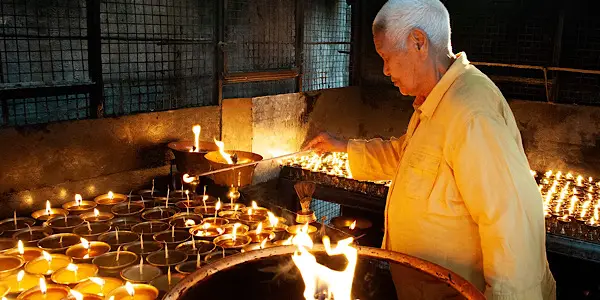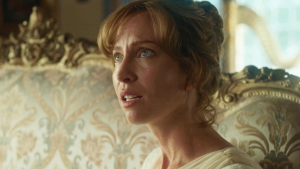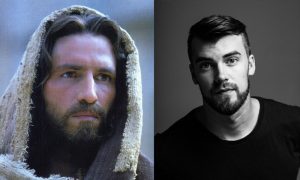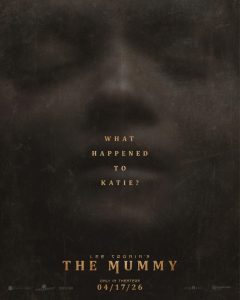
MOLA – A Tibetan Tale of Love and Loss, a beautiful documentary about Kunsang Wangmo, a 100-year-old Buddhist nun exiled from Tibet in 1959, recently screened at this year’s SXSW. Film Inquiry was able to sit down with co-directors (and family of Kunsang) Martin Brauen and Yangzom Brauen and Executive Producer on the project through Union Editorial, Michael Raimondi, to discuss this very personal and powerful story:
This interview has been edited for clarity.
Congratulations on the movie! How has the experience been for you so far?
Yangzom Brauen: Yeah, it lively— I mean, the audience was very lively, and I really appreciated the questions. There were far more than we received in Switzerland. We first showed the movie there, and I was surprised by the positive response and thoughtful questions. That’s always important, to see how people connect.
So you originally premiered in Switzerland?
Yangzom Brauen:: Yes, at the Solothurn Festival.
That’s great! This is an amazing story. What made you decide to make the documentary? Was that always the plan?
Martin Brauen: Your English is much better than mine, you go ahead. [Gestures to Yangzom]
Yangzom Brauen: My dad and I both, independently, had the idea to film my grandmother and document the last years of her life—to capture who she is. She’s one of the last generations of Tibetan women who is a nun, born in 1915 in Tibet. I’d already written a book, but we felt we needed to tell it through film. My dad got a camera, figured out sound, and started filming my mom and grandmother. When I was there, I helped film, and we spent a lot of time discussing what we wanted to show.
At first, it was mainly about spirituality, her rituals. Then it took on a new dynamic when Mola, what we call my grandmother, turned 100 and said she wanted to go back to Tibet to die there. Suddenly, the film wasn’t just about her rituals, but about her longing to return home and a longing for paradise.
We also realized we couldn’t cover all of Tibet’s history in the film, which was a challenge. That’s where our editors really helped. We started with a Swiss editor we loved working with, but he didn’t have time to finish, so we turned to Union Editorial: Michael, Jim, and Kit at Union brought a fresh perspective and really helped shape the final version. We’re very grateful for that collaboration.
As you said, things shifted during the process. You even wrote a book—how did the film differ?
Yangzom Brauen: The book is about three generations of Tibetan women: my grandmother, my mother, and me. The film focused specifically on my grandmother, but it naturally became a mother-daughter story, too. We didn’t expect that. We were so close to the material that we didn’t realize what we had until others looked at it from the outside.
Did this originally start as a feature documentary idea, or were you just interviewing her?
Yangzom Brauen: We always wanted to make a feature documentary, but originally it was about her spirituality. We tried to interview her, but it didn’t work well. She was quite old, and she wasn’t used to speaking about her beliefs. She practiced her religion through daily rituals that began at 4 a.m. and ended around 5 p.m.
In her life, she showed her beliefs through her actions. She welcomed people into her home, offered tea, even let them stay for months if they needed help, even if they didn’t share a language. That was her spirituality, and we realized we could show it, but reflecting on it with her directly wasn’t possible.
source: YangZoom Films
She clearly had a warmth that affected people. How long did you film, and what was the editing process like?
Yangzom Brauen: The whole process took over 10 years. We started filming in 2014, and she passed away in 2019.
Martin Brauen: After she passed, we filmed again. We kept her ashes, and in 2023, we finally went to Nepal to complete the death rituals, as shown in the film.
What was that experience like? It seems like a powerful closure.
Yangzom Brauen: It was very emotional for my mother, who went with my father. I wasn’t there, but for them, it felt like the circle closing. It was important to do that for my grandmother.
Michael Raimondi: I’ve already told my wife she needs to make statues from my ashes one day! I really mean it.
Yangzom Brauen: Michael, we would love to hear your perspective on the film.
Michael Raimondi: I’m sorry Jim couldn’t be here, he had a death in the family, but when the film came to us, what stood out was the sense of family, set against Buddhist traditions. In the U.S., we’re fascinated by Buddhism, but many don’t truly understand it. This was a human story: universal, relatable, and educational. Those are my favorite documentaries, the ones that draw you in emotionally, and along the way, you learn something. The death ritual at the end—I didn’t know about it, and I don’t think many Americans do. It’s so beautiful. I joked about wanting that for myself, but I kind of meant it.
Yangzom Brauen: When I watched the film again and saw Sonam, my mother, mix the ashes with clay, I cried. It’s such an intimate act—taking the ashes of a loved one and creating figurines to place in a holy place. Very special.
Martin Brauen: And Mola wasn’t just serene and spiritual, she was human. She fought with her daughter, was mischievous, sometimes harsh. Family dynamics are tough, right? And I think people can really relate to that story. When we were watching the film, I looked around and everyone was crying because it’s a story we all understand. I don’t know if everyone feels this way, but I certainly do, and I know a lot of people want some sort of approval from their family, especially from their parents. Your mom wanted that too, but it was hard for your grandmother to give it. I think that’s a normal part of family relationships. What was interesting is that even a Tibetan nun, who we often put on a pedestal, went through the same thing. But as she would say, “we’re all part of this one thing, and we’re all the same.” That really touched me. I felt it deeply when I first saw the film, and I’m really proud to have worked on it with you.
source: YangZoom Films
That’s beautifully said. What do you hope audiences take away from the film?
Yangzom Brauen: One thing is awareness of what happened to Tibet, and why Mola had to flee to Switzerland. That’s part of her life and why she agreed to be filmed. It’s for Tibet. We want people to be curious, to learn about what happened there, because people forget. Many don’t even know where Tibet is.
Martin Brauen: Another layer is showing what it means to age with dignity. Mola could do what she wanted, and she was tolerant of us, which isn’t always the case with religious figures. She was strict with herself but open to others’ ideas. That tolerance was a beautiful part of her.
Yangzom Brauen: And the other thing I think we could learn from her is she never gave up. We don’t tell the whole story. She very early lost her mother, then her father, which is mentioned in the movie. Then she had actually four children. Two passed away just after the birth. And then she had to run away to India, where she, as we say in a movie, lost her daughter, or second daughter, and then finally her husband. But she never gave up, and she was always again, strong. That was that’s also very important. And I think the most important secret of this is her belief. She believed in what she was taught. And we can learn from her perseverance. She stayed strong and followed her path. Her faith was the foundation of that strength.
That’s a powerful message, especially for today. Thank you so much for your time and congratulations on the film!
We want to thank Yangzom Brauen, Martin Brauen and Michael Raimondi for speaking with us.
Does content like this matter to you?
Become a Member and support film journalism. Unlock access to all of Film Inquiry`s great articles. Join a community of like-minded readers who are passionate about cinema – get access to our private members Network, give back to independent filmmakers, and more.









